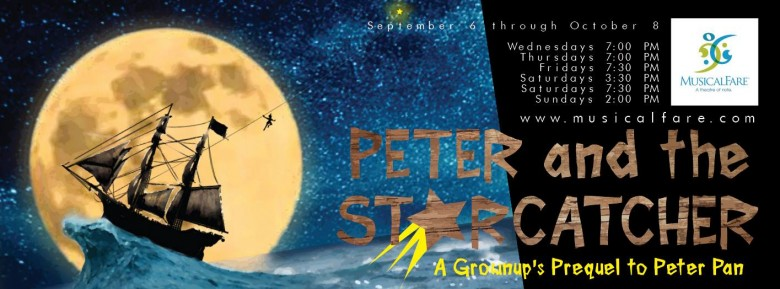Peter and the Starcatcher is a lively, almost carefree romp that tells the backstory of Peter Pan in a very un-J.M. Barrie-like manner. Based on the novel by humorist Dave Barry and novelist Ridley Pearson, and written for the stage by Rick Elice, it is a hoot, pure artifice – witty, clever, goofy and just a lot of fun. Currently at Musicalfare Theatre, it spans the cultural gamut from fart jokes to commentary on the elusive melody in operas by Philip Glass. It is a coming-of-age adventure story about the boy who never grew up and the remarkable girl who inspired him.
An orphan called Boy because he has no name has been abused all of his young life and is sold into slavery along with two others (Ted and Prentiss) from the orphanage. Captain Slank takes the boys to his ship, The Neverland, which will sail to Rundoon to sell the boys to the evil king there. Meanwhile, Lord Aster has been tasked by Queen Victoria (God save her!) to take a precious cargo to Rundoon on his ship, The Wasp. Lord Aster hires Slank to watch over his daughter, Molly, on The Neverland while he completes his mission. He will meet up with her on Rundoon. The trunk holding the precious cargo is switched by Slank with another, so the cargo ends up on The Neverland. Molly finds the orphans and the adventure begins. And what is a Starcatcher, anyway?
Twelve actors play dozens of roles – pirates, sailors, natives, orphans, mermaids, and others, along with the major roles. This is a fast-paced spectacle that was deliberately written without all the bells and whistles of modern staged fairy tales. The staging relies on storytelling and the ingenious use of everyday props like scarves, both large and small. Doors and walls are played by actors on the wooden ship-like set that becomes an island in Act Two.
The acting is first-rate. No exceptions. Everyone does their parts with enthusiasm and in character, whichever character they happen to be in the moment.
Steve Copps is outstanding as Black Stache, the pirate who tries to steal the precious cargo. Is he a fop? Is he a vicious pirate? Fop-Pirate? Pirate-Fop? He goes back and forth between these personas in a flash, prancing and mincing one second, terrorizing captives the next. His facial expressions and physical movements are perfectly timed. He had the audience laughing with just an eye roll. I loved his performance.
Also outstanding is Renee Landrigan. She plays the precocious 13-year-old Molly with intelligence and wit. She moves around the stage in a quick and graceful manner in her little pinafore, one minute the warrior woman ordering the boys around, the next a shy nervous girl falling in love for the first time. Very well played.
Anthony Alcocer as Slank/Sanchez/Fighting Prawn is a riot. His delivery of the dialogue of Fighting Prawn in Act Two is hilarious. He is excellent in all the roles, but I particularly liked that one, watching him spew venomous words like lasagna and tiramisu at “The English” who he hates.
Jesse Tiebor is moody, frightened and wary of adults in his role as The Boy who comes out of his shell and finds adventure and possibly love. Jordan Levin as Mrs. Bumbrake is quite the girl, and Jacob Albarella as Alf, her would-be suitor, make a lovely couple. He also is one of the main storytellers, explaining the action, with and without his belly. The excellent cast is rounded out by Bobby Cooke as Lord Aster; Kevin Craig as Smee; Philip Farugia as Grempkin/Mack/Hawking Clam; Daniel Torres as Prentiss, who so wants to be a leader; Doug Weyand as Capt. Scott; and Preston D. Williams as Ted, who cannot figure out how to eat the pineapple. Oh, and there’s a flying cat.
Director Chris Kelly has conjured up a delightful and inventive show with his team of Philip Farugia, music direction; Chris Schenk, set design; Chris Cavanagh, lighting and sound design; Kari Drozd, costume design; and Susan Drozd, hair, wig, and make-up design. Mr. Kelly keeps things moving along in this two-and-a half-hour show (I only wondered once how long it would be, and then only briefly). There is a lot of physical movement in this play, and the blocking is such that it never seems as though people are just milling about or wondering where they should be. It flows. And he allows his actors full expression while keeping up the pace and letting the free-wheeling dialogue, well, wheel-free.
Growing up is not an easy proposition. Thirteen may be the most difficult age of all, when being a child is no longer tenable, but being an adult is not yet possible. The Boy and Molly struggle with their longings and their hormones, but they do it in a very charming way, while developing the beliefs that they will carry throughout their lives. And they have that whole cast of bizarre and wonderful characters to provide the context in which to do it.
And the opening number in Act Two, called Star Stuff, is not to be missed.

